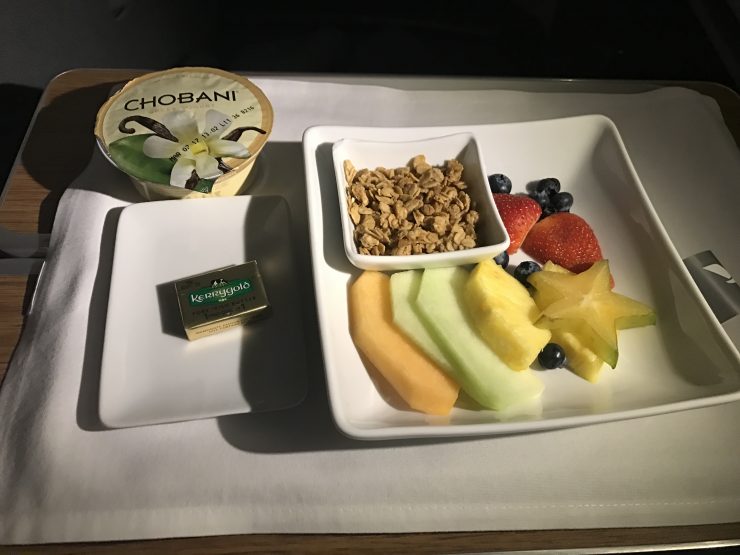I recently flew to Hong Kong on an American Airlines flight leaving Dallas-Fort Worth in late afternoon, and arriving into Hong Kong in the evening. We were served a full meal upon departure, and then a pre-arrival breakfast shortly before landing. At the time, it seemed just a bit odd to me; as it does every time it happens.

Pre-Arrival Breakfast
Apparently United does the same thing, as reported by Zach Honig:
Breakfast at dinnertime on #UA871 pic.twitter.com/wqlJPOnRbE
— Zach Honig (@ZachHonig) February 17, 2017
But despite that, I wonder why. I mean I totally get the diner or IHOP concept or Breakfast All Day Long, but, many try to acclimate to their destination; does breakfast help do that, when you are landing at 5pm at night?
The Sleep Cycle School of Thought
I suspect one school of thought on this, is that on most long haul flights, passengers are “naturally” lulled to sleep. After they are given a filling meal, the cabin lights are dimmed, the flight attendants start their rotation for crew rest, and typically are not in the aisles.
As the flight nears its destination, the crew appears again, passengers slowly–or not so slowly–wake up as the cabin lights are left on their brighter setting–perhaps even too long after the meal. Passengers have just woken up, so the logical meal to serve is breakfast, right?
What about acclimating to your destination?
Some go out of their way to beat the jetlag and try to acclimate to their destination as early as possible. Some even try acclimating before they have even boarded their plane! I for one like to acclimate on the flight, followed by as much direct sunlight for morning arrivals, or a few more hours of sleep for evening or late night arrivals.
Seldom do I ever truly enjoy the pre-arrival breakfast meal. In fact, regardless of the time, I think I personally would appreciate a sandwich. For me, I’m less thinking about the time of day, as I am the substance. Many say that breakfast is the most important meal of the day. Tim Ferriss’ latest book, Tools of Titans found, interestingly enough, that most high performers either skip breakfast or have a very light bite. I generally skip breakfast, except for when I’m traveling, and when I do eat it, only about half the time do I have what I would consider a “full breakfast.”
Wrapping Up – Pre-Arrival Breakfast
In the big scheme of things, this is clearly a #FirstWorldProblem, but it still begs the question of why airlines serve breakfast so much more frequently than anything else. It could be that there is some higher logic, or maybe its just a fairly easy or inexpensive meal to serve?
What do you think about the pre-arrival breakfast for an evening arrival?
I wonder if it is a much cheaper meal for the airlines to serve. Very few airline breakfasts seem good to me compared to their lunch/dinner options. Saudia is one of the few that comes to mind as good with an ‘Arab’ breakfast and a blini breakfast. When in premium cabin I request flight attendants to not wake me, especially on an airline where there serve it two hours prior to landing.
@Stefan – thanks for the comment (and link)! — I tend to agree… Breakfast is the lesser meal, not sure if it is cheaper, but, at least that’s the feeling I get. I totally get your preference to not be woken up, my concern is that after a 16 hour flight, I feel like I need to eat something, otherwise I’ll be grumpy for the immigration officials.
@Stefan – I do wonder if breakfast is cheaper… its certainly not better. Generally speaking, I try to avoid being woken up when its breakfast, but, inevitably, its hard not to be woken up by the clanking of silverware on china.
Pingback: Recap: Business Class For Two, Disney Fireworks Spend & More - Doctor Of Credit
Pingback: Morning Chai: Costco Tasty Bonus, Why Serve Breakfast and a Strange Year at Uber - Rapid Travel Chai
As a former flight attendant (1970s), my guess would be space constraints. If a flight is at full capacity, the galleys would not hold all it takes to serve two hot meals per person. Enlarging the galley storage would mean sacrificing a seat or two.
@Elizabeth – Thanks for your comment! So, breakfast is an easier meal to serve based on limited space? I can’t say I disagree with the logic, given how cardboardy most breakfasts are, in the air.
A hot meal has two parts that are initially loaded separately. The entrees are loaded in oven inserts and the tray set ups are in different bins. The oven inserts slide into the oven to be heated, then the individual dishes are pulled out and put on trays to serve. Of course, this explanation doesn’t explain why they wouldn’t serve a more substantial cold meal in place of the breakfast.
@Elizabeth – thanks for your feedback! Of course, I’m left with more questions than answers as to why airlines serve breakfast over other options before arrival. I feel like its just “easier.”